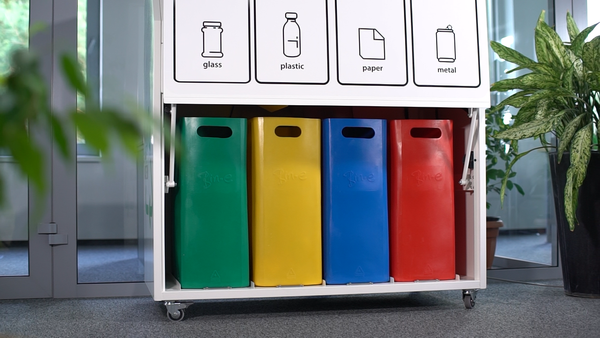Bin-e Creates Contactless Smart Bin

As the world begins to re-open, a new way of life is being introduced. Everyday tasks and items are being reconfigured to adhere to social distancing protocols and provide a safe way to return to “business as usual”. Because of this, there is an increase in demand for products that improve safety in public places.
Bin-e, a Dąbrowa, Poland-based smart waste bin provider, has introduced a new contactless version of its intelligent waste segregation bin. The touch-free bin has a flap that opens automatically.
“We believe that technology and environment are not mutually exclusive, that powerful innovation can be used to create a clean planet,” Marcin Łotysz, Bin-e CTO and co-founder, said in a statement.
Bin-e also automatically recognizes the type of waste. It uses a proprietary system that uses artificial intelligence algorithms to identify the object. Then it segregates the waste into the right fraction, compresses it and communicates with the user via a built-in screen. It also has the ability to control one or more devices through a mobile application.
“Contactless Bin-e is new version of Bin-e, (a) device that sorts and compresses the recyclables automatically,” says Wojciech Lyszczak, Bin-e chief marketing officer. “It combines unique AI-based recognition, fill level control, and data processing to make waste management convenient and efficient.”

Launching next month, the new contactless Bin-e utilizes motion sensors to open the bin’s flap.
“Almost a year working really hard -- first planning, getting demand from the market, then collecting budget for that project, finally the tech department implemented that feature into the machine,” says Lyszczak. “A lot of R&D work was to be done, many obstacles needed to be overcome.”
The next steps for the new contactless include outdoor and multi-sorting versions.
“We believe that function is needed all over the world and new version of Bin-e will be game changer in many offices, smart buildings, public spaces etc.,” says Lyszczak.
Launched in 2018, Bin-e is an IoT-based smart waste bin created for automatic waste segregation. Its functionality is based on a combination of mechanical and electronic elements along with software and elements of artificial intelligence.
Bin-e recognizes, segregates and compresses waste automatically. It is based on an object recognition system that uses machine learning and artificial intelligence algorithms. Bin-e also has a fill control sensor and notifies the waste disposal company automatically when one of the bins inside is full. It is connected to an Internet of Things (IoT) platform that manages the data collected by the device.
Bin-e increases the amount of recovered resources and reduces the amount of waste that goes to landfills. It transforms waste management into an integrated system to facilitate the way towards a circular, sustainable economy, according to the Bin-e website (http://www.bine.world/).
“We aimed to provide our customers with a complete solution. Smart waste management has to be smart on many levels,” Jakub Luboński, Bin-e CEO and co-founder, said in a statement. “This is why we have combined automatic sorting, compression, fill level control and data processing into one device. All these functions allow to transform waste management into an inte
About the Author
You May Also Like


.png?width=300&auto=webp&quality=80&disable=upscale)